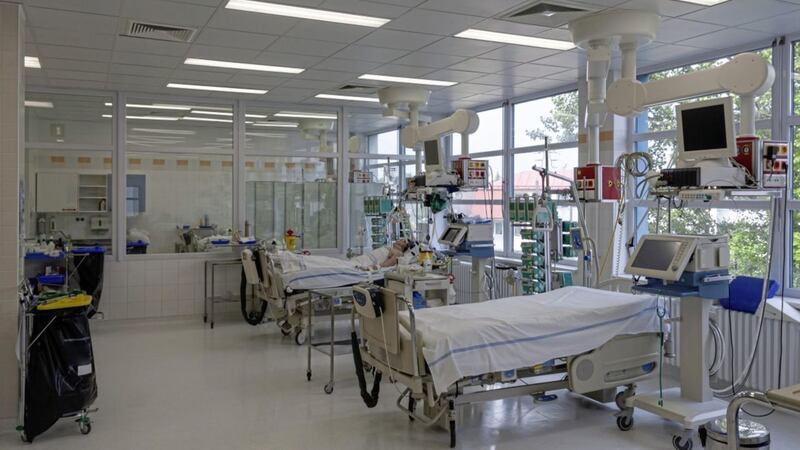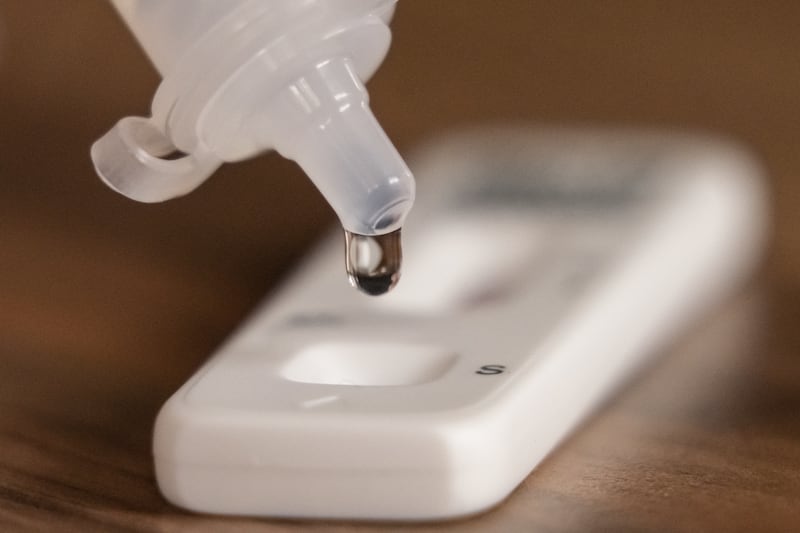FOR patients of Covid-19 displaying mild symptoms, recovery may take several weeks to one month. But for those who are hospitalised, the road back to full health can be long and challenging, with patients who have been intubated – had a tube inserted into their windpipe to allow assisted breathing with a ventilator – facing the toughest convalescence.
As patients awake they might find that they are unable to sit up unaided due to weakness and fatigue. Spending a long time in a hospital bed leads to muscle wastage and some patients may need help and support to walk again. There may also be problems with breathing, speech and swallowing, not to mention the toll on their mental health.
This is where the allied health professionals (AHPs) step in, playing a pivotal role in the long-term recovery of Covid-19 by providing a holistic approach in their front-line delivery of rehabilitation. In the north, AHPs are the third largest workforce in the NHS alongside doctors and nurses, with over 6,500 currently working in a range of surroundings including hospitals, surgeries and community settings. During this pandemic, many AHPs have been deployed in critical care.
Jennifer Keane, Chief Allied Health Professions Officer NI, says: “Rehabilitation is critical to ensuring our population's recovery from the impacts of the pandemic and the long-term sustainability of the health and social care system.
“As AHPs, we are in a central position to shape the rehabilitation agenda while working as part of the wider multidisciplinary and multi-agency teams.”
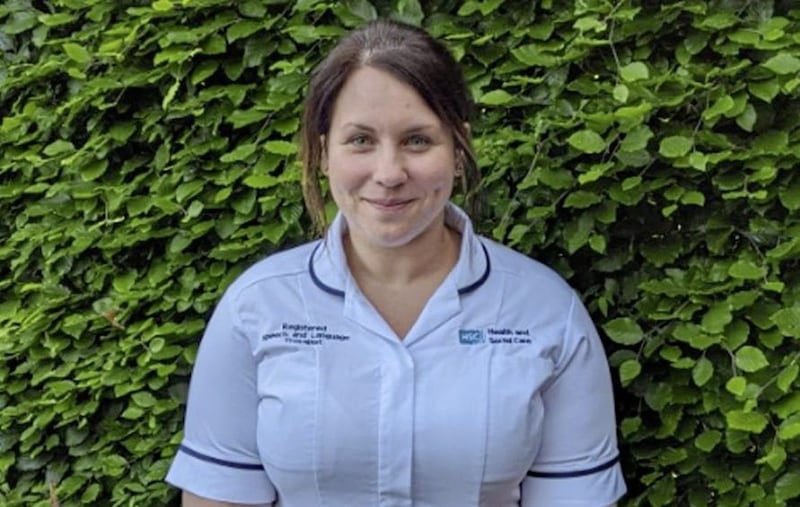
THE SPEECH THERAPIST
Helen Dawson works as a speech and language therapist in Antrim Area Hospital's adult acute team. The Magherafelt woman normally works with patients who have progressive conditions such as dementia, focusing on their speech and swallowing difficulties. Since the outbreak of Covid-19, she has been helping in the rehabilitation of patients who have had the virus.
“Being able to communicate, being able to eat and drink are basic human rights. To lose the power of speech and swallow has a huge impact on the quality of one's life,” Helen says.
“Some of the patients I've worked with in the hospital have required ventilation and because they have a tube going through their mouth and voice box into their lungs, they can't eat or speak. There can be long-term damage to the voice box or vocal cords. Patients might have lost their voice or they might be hoarse. Our job is to support them to find other ways to communicate.
“Because Covid-19 affects breathing, even if you're not on a ventilator you might be short of breath and fatigued. This too can affect the ability to coordinate swallowing with breathing. If swallow is unsafe we have to find safer consistencies until they are improved. This means following them through to general wards after discharge from ICU.
“We're finding that we're having to refer some patients on to community speech therapy to deal with the longer-term effects of Covid-19. It can take up to eight weeks for some who were on ventilation to have their voice return to normal.”
Helen, who was seeing patients daily at the peak, said that speech therapists were having to adapt their ways of working. Swallow and communication assessments are proving more difficult than usual as patients are unable to see the mouths behind the masks to follow their movements or mimic exercises.
“In a lot of cases, Covid patients have delirium so you can imagine how frightening it must be for them when they can't see your face,” says Helen.
“There are so many challenges around getting them to eat and communicate properly again. Initially patients will need dieticians involved and then they'll be referred to us for a swallow assessment. We aim to have them eating and drinking again, cautiously, over time. How long that takes depends on the person.”
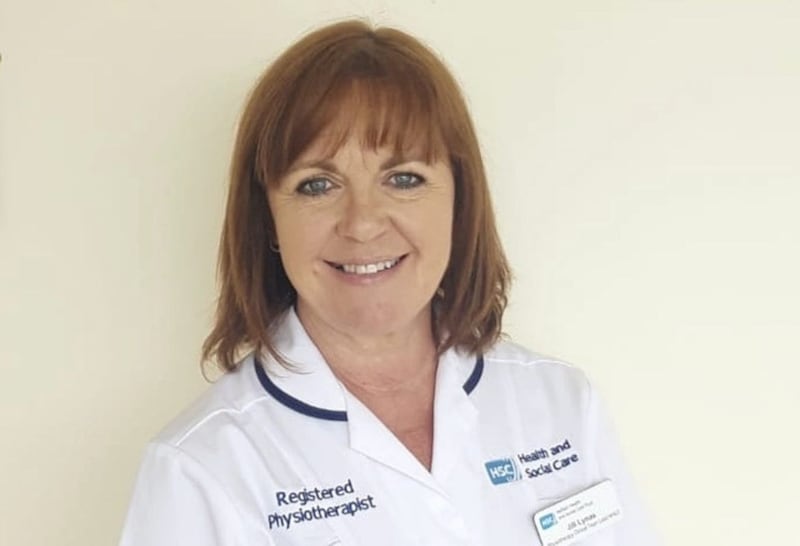
THE PHYSIOTHERAPIST
Jill Lynas has a background in community physiotherapy and was deployed to the Ramada 'step down' facility in Belfast city centre to help with the rehabilitation of Covid patients discharged from hospital.
After being weaned off oxygen, patients are weak, de-conditioned and often confused. It is the role of the physio to help build the Covid patient's strength so they are able to walk again but in many cases, the first step is to ensure they can sit up.
“Prolonged bed rest leads to significant muscle wastage and weakness so it can take the assistance of two people to help the patient progress from lying to sitting,” Jill explains.
“With gentle exercises and walking practises, the aim is to get the patient mobile again. Their exercise tolerance is low so this needs to be increased to the point where they are mobile enough to move on from an acute site. Some patients might need a care package or some might need further rehabilitation in the 'step down' facility.
“We have some patients who have been here for quite a significant period. Some have post-Covid delirium which makes it difficult to provide rehabilitation. If they're confused, it slows recovery down.
“And strength and balance is decreased as part of the overall weakness, which can make patients prone to falls, particularly if they don't have awareness about safety.”
Physiotherapy is provided to the patients in the hospital, even before they reach the 'step down'. Then the rehabilitation process is taken up another level.
“There have been challenges,” she says. “From a physical rehab point of view, it's been tough because the patients are so weak from prolonged bed rest and the infection.
“And for the patients, it can be disorientating with everyone in masks and PPE. It can be hard for us to give instructions.”
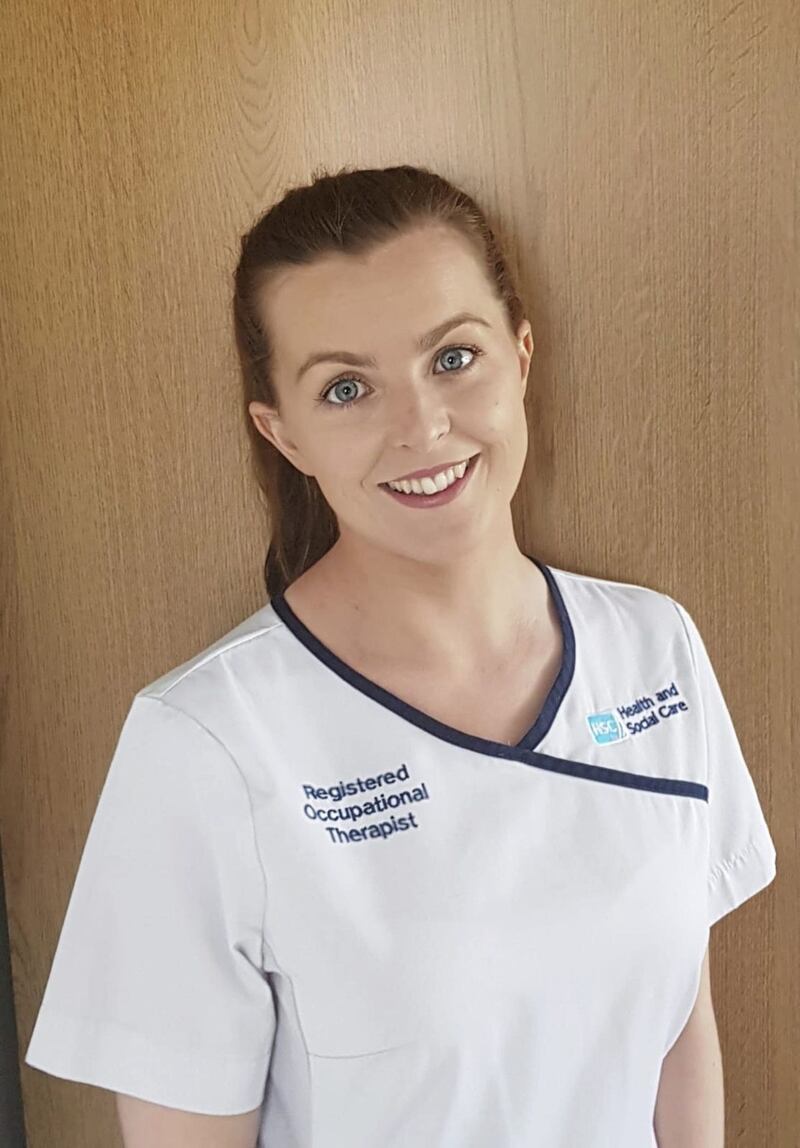
THE OCCUPATIONAL THERAPIST
Lurgan woman Fiona Toal works for the Southern Trust's reablement team based in Banbridge. Her position as a community occupational therapist involves taking a holistic approach to the patient; looking after their physical, emotional and psychological needs.
“With Covid-19, many patients found that their daily roles were taken away from them,” says Fiona. “We had a woman who wanted to get her fitness levels up again so she could go shopping with her daughter, and a farmer who wanted to get back on to the farm. Their main goal was to get out of hospital and regain their independence.
“So our job is to try and get them motivated enough to engage in rehabilitation and to reassure them that they will be able to do those things again. But they have to be able to get up, washed and dressed before they can go shopping or return to the farm. It could be weeks before they're able to do those things so they have to be motivated to stick to the rehabilitation plan we develop for them.”
For OTs based in hospitals, a seating assessment is key. Sitting up helps to open the patient's airways and strengthen core muscles. With fatigue such an issue too, OTs assess the need for special equipment including perching stools, bed sticks and toilet aids: with patients encouraged to use them as much as possible.
The normal working pattern of OTs, like other allied health care professionals, has changed throughout the pandemic with support services available seven days a week and staff working until 8pm. They have also had to upskill in areas like infection control and PPE as well as looking out for the mental health of their patients.
“There was a real fear about letting us come into their homes and we've had to reassure them that we have the right PPE and that we adhere to social distancing as much as we can,” says Fiona.
“But it's hard when the first time they meet us, they can't see us smile from behind a mask.
“For those who are anxious about us coming out, we can still offer our resources via telephone or the internet. At the end of the day, the better the rehab, the better the outcome.”
